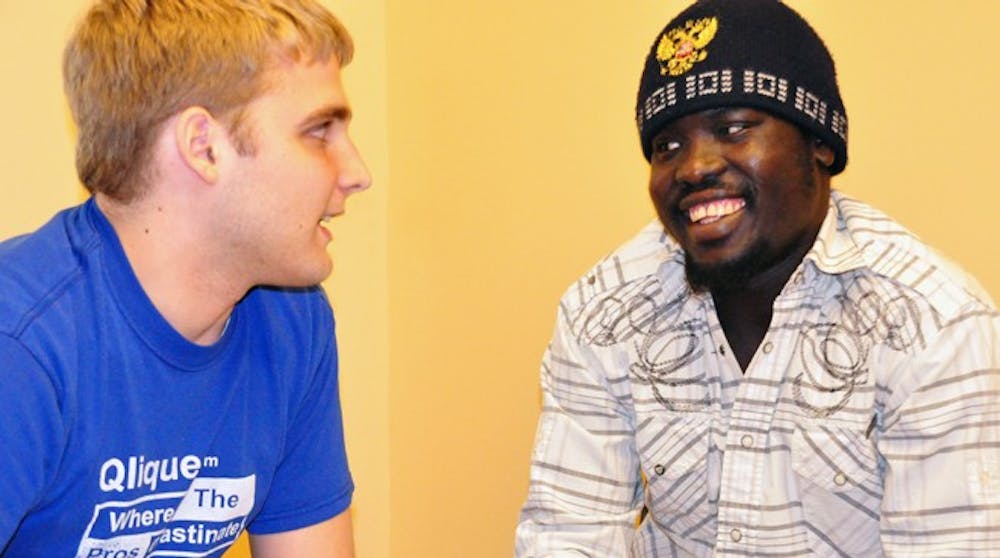Majak Yai leaned over the book and carefully sounded out the words.
"And she can turn people into st-stone and do all kinds of horrible things," he read aloud.
He finished the chapter, closed the book and smiled.
"I think it's better than before, right?" he asked his tutor.
Just seven months ago, Yai, 24, did not speak English.
"When I started, I did not even know to say 'Hi,'" he said.
Now, with the help of six dedicated tutors and C. S. Lewis's "The Lion, the Witch and the Wardrobe," he can speak it, read it and write it a little, too.
Veronica Shreve, a freshman at Richmond and one of his tutors, gave him the book to practice reading in January, and now he's on the fifth chapter. "That book," Yai said, "it teach me a lot."
Yai is from Sudan. He escaped the war-torn country when he was 14, leaving his family for Egypt.
"In Sudan we have fighting," he said. "It started long time ago. We born in the war, and we grew up in the war. We don't know what is the problem but when I was young ... I saw a lot of problem there.
"I told my parents, 'I need to get out of this country.'"
Yai finally landed in Richmond when he was 20, in 2007.
Enjoy what you're reading?
Signup for our newsletter
He has worked at the Heilman Dining Center for more than three years and this year began learning English through the Center for Civic Engagement's ESL Tutoring Project. Yai's first few years in Richmond were hard, he said. (Actually, he used the word terrible, which he learned in last week's lesson.)
He often didn't understand what people were saying, he said, and got frustrated by not being able to communicate. He talked to his manager, Jerry Clemmer, and Clemmer helped set up the tutoring for him.
"I was real excited to get a little education," he said. "It's not a lot, but before I don't even know what education means."
Yai works a full day at D-Hall and then practices English with his tutors for two hours or more. He goes home at 8 p.m., eats dinner, practices reading and writing for two more hours, goes to bed at midnight and starts over again at 5:30 a.m.
"It's kinda very nice," he said. "When I was in Egypt, I used to work about 14 hours, 16 hours a day for one dollar.
"But here, it's good, you know? You work, you get a salary. It's really good."
This year, Yai said, was his happiest year so far in America.
"I'm very happy because [of] the [ESL] program. I really appreciate the people that come here. They work hard to help me a lot so God bless them."
There are about a dozen staff members being tutored by the ESL Tutoring Project, said sophomore Savannah Gillespie, the student coordinator.
There are more than 30 undergraduates who volunteer their time to tutor one student each, so the students usually meet with several tutors throughout the week, Gillespie said. Most students get tutored for eight hours each week.
The program was started by a Bonner Scholar about five years ago, program adviser Adrienne Piazza said, and undergraduate students had run it ever since.
Gillespie took over this year and has worked to formalize the curriculum through an independent study with Nuray Grove, the director of ESL services at Richmond.
This year, the number of volunteers has soared, and Gillespie wants to add more kinds of instruction to incorporate the growing number of volunteers, she said. She hopes to offer computer classes within the year.
Already this semester, tutors have accompanied the immigrant staff members to a human resources' benefits fair to help explain options like retirement plans and life insurance. This year, the program also became part of the Refugee and Immigrant Issues Coalition, a student-run partnership between the ESL Tutoring Project and a program in downtown Richmond called Refugee and Immigrant Services.
There is a large refugee population in Richmond because it's a gateway city, said Clemmer, the director of residential dining. The university didn't have a policy to encourage hiring immigrants or refugees, he said, but he ended up hiring many of them because they were qualified applicants.
More than 10 immigrants worked at the dining hall, Clemmer said, and some of them had taken ESL classes for years.
"Immigrants' number one challenge is English," he said. "So it's a nice start for them."
For Yai and other students in the ESL Tutoring Project, learning English is only the first step. Next, Yai wants to learn algebra and science and eventually apply for citizenship. In the meantime, everyday life is easier for him. He can answer customers' questions in the dining hall, fill out his own forms at the Department of Motor Vehicles and talk to the mechanic when his car breaks down.
"English opens up a whole new world for them," Shreve, his tutor, said. "It makes everything possible that we take for granted in this country."
Contact reporter Ali Eaves at ali.eaves@richmond.edu
Support independent student media
You can make a tax-deductible donation by clicking the button below, which takes you to our secure PayPal account. The page is set up to receive contributions in whatever amount you designate. We look forward to using the money we raise to further our mission of providing honest and accurate information to students, faculty, staff, alumni and others in the general public.
Donate Now



